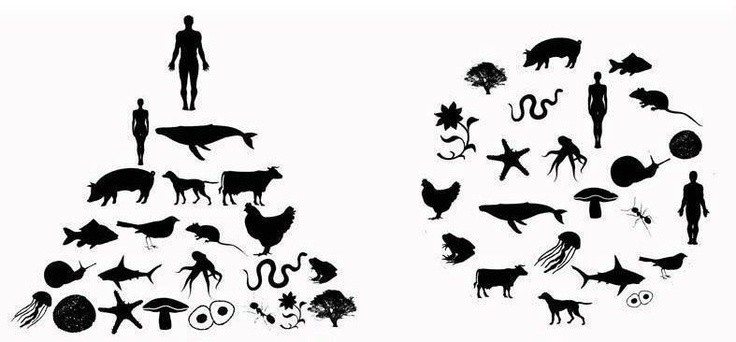The deception of Ecocentrism

From a very young age I had contact with Nature. As a child I frequented with my parents a national park near our home, and as a young man I spent almost every afternoon after high school classes, riding a mountain bike through the forests and slopes of the sierras. Often, on weekends, I would tour long stretches of territory in the mountains in my homeland with fellow cyclists. I have been a mountaineer for more than 20 years now.
After finishing high school, I enrolled in Medicine School, but over the years, that seed of appreciation for natural environments that had been placed inside me as a result of so much contact with Nature, began to germinate until the firm conviction to change career and study Biology emerged in my mind. It was not a sentimental decision, risen out of mere aesthetic appreciation for Nature; I was driven by an intense desire to UNDERSTAND. Understand the fundamental element of our reality, which is Nature, the world that humankind inhabits. I knew that in Biology I would find the basic tools necessary to undertake that exploration.
Many years have passed since then, and I have trodden a long path of constant and increasingly expansive study. I studied a master's degree in science, specializing in watershed management. On my own I have addressed oceanography, geology, environmental engineering, and the philosophy of natural sciences. I have done research in forest and river ecology, I have worked in soil restoration and reforestation, in the management of invasive exotic species, and I have volunteered my knowledge in advising municipal and state governments on environmental issues. At the same time, I always paid attention to continuing to cultivate my knowledge in other areas of human knowledge: philosophy, economics, technology, history, sociology, and of course, literature, and finally, politics. I have also addressed my own human psyche, having completed years of psychoanalysis.
Over time, my perspectives, shaped by so many subsequent realizations about what was observed and studied, have evolved. If I had to choose one main lesson among it all, it is that human ideologies can reflect no greater precision and consistency than what the depth and breadth of knowledge from which they sprout can allow.
The harsh truth is the following: the ideologies predominant today in environmental conservationism reflect ignorance and sentimentality rather than knowledge and rationality.
Any person with sufficient knowledge and strong critical analytical skills is capable of recognizing how environmental conservationism has been hijacked today by a certain political agenda. It is not that a certain political ideology coincides with the recognition of environmental problems in themselves: it is rather that said political ideology has recognized that social concern for the environment can be manipulated and taken advantage of at its convenience to promote, expand and strengthen itself.

The problem is that graduates of classic environmental college courses, mainly biology and to a lesser extent engineering in different environmental disciplines, receive, learn and reproduce an indoctrination that gravitates around a primarily sentimental conceptualization regarding environmental problems, which , without a sufficient and necessary breadth of knowledge to counterbalance this sentimental burden, is externalized without restrictions and accepts willingly without question the rest of the indoctrinating propaganda that the political ideology that monopolizes the environmental issue has at hand to manipulate and handle its environmentalist soldiers.

The epitome of this propaganda is the concept of ecocentrism, contrasted as a replacement for the criticized anthropocentrism.
On the surface, ecocentrism seems a good concept. Of course, any scientist trained in ecology recognizes that human beings are an integral part of the planetary ecosystem, and that, as such, their survival depends directly and indirectly on the functionality and integrity of ecosystems and the enormous diversity of other life forms that inhabit Earth. We are not, in this sense, special, or different, or independent, or free from the rules that underlie Nature and its delicate and wonderful balances and dynamics.
And of course, there is an anthropocentrism that has been pernicious and extremely harmful to ourselves and to Nature; It is the anthropocentrism of pride, arrogance, naivety and contempt for Nature and ignorance of it and its functioning.
However, and here lies the crucial point of my message:
The ecocentrism that today is being presented as the philosophical mindset needed to solve socio-environmental problems is a fallacy, a trap, that leads to the degradation of human beings. It is based on naive illusions, and ultimately, on simple and plain cowardice. It is a concept that despises humans, vilifying them and reducing them to a triviality, not because being ecologically equivalent to other living beings is trivial, but rather out of a pathological subjective judgment that seeks to make us pay for our environmental and social sins.
An ecocentrism that subreptitiously proposes that humans, since they are not in charge of Nature, have no responsibility of stewardship in regards to it, and therefore have no risks to face, decisions to make, unknowns to answer and horizons to reach. Of course, ecocentrism argues that there is a responsibility in having to learn to respect the environment, to work to achieve a form of harmonious coexistence with Nature. But the way, the perspective that such a concept proposes to achieve this, is one of resignation, one that minimizes the potential meaning of humanity, one that aims to "free us" from the burden of searching for that meaning and facing the terrors and existential voids that along the way it is necessary to face in order to address the mistakes that have been, are and will need to be made in order to learn the truth. It is an ideology that proposes that we have already learned enough, and that there is nothing left but to learn to live in community and in harmony, because there is nothing beyond and to try is to condemn ourselves to perish and become extinct.
And of course, this political ideology accompanies ecocentrism with its other proposal, sometimes explicit, but always implicit: we must replace capitalism with socialism, arguing that capitalism is the reflection of anthropocentrism, and that socialism is the natural reflection of ecocentrism.
The problems that I point out are equally transported to this argument. Any well-informed and free-thinking person, protected from sentimentalist rhetorical discourses, knows and recognizes that capitalism, despite its flaws, has been the fundamental engine that has lifted humanity from its precarious material and spiritual condition and has allowed us to greatly expand the horizons of our knowledge on the world we inhabit, and our position in it. Capitalism has been what has lifted billions of humans out of poverty, both in absolute and relative terms.
A sensible person will question then: why is there such determination by this political ideology to completely replace the system – with one that repeatedly throughout history has been shown to fail terribly, causing terror, agony and death to tens of millions of people – instead of proposing to work to clearly discern the current system's flaws and find ways to overcome them, thus improving the model and transcending to a higher form of it?
The answer is that there is an innate cowardice in those who lead these proposals. Because just as they do not invoke for themselves or others the spirit of encouragement to work to right the anthropocentrism of before and create a new and transcendent one, preferring to propose lowering humankind's position to one that exempts it from responsibility, in the same way they prefer to return to utopian, naive and unrealistic visions that, although dressed in the appearance of justice, equity and benevolence, are actually born out of selfishness, resentment and cowardice.
What humans must exalt as a vision is an anthropocentrism of responsibility and duty. We must have the courage to accept that we have been given an intelligence superior to that of other species, an undeniable capacity to manipulate and transform much of Nature, and that this brings as an inseparable consequence a superior and sacred responsibility that we cannot reject, no matter how much ecocentrists want to avoid and deny it. It is not for nothing that it is that same political ideology that systematically works to tear down the spiritual edifice that for centuries has been the moral support of humanity in its arduous path to progress.
It is not by chance that this ideology proposes that the institutions that have been the crucial framework of cultural and moral support, such as family and traditional education, be discarded and replaced by progressive forms devoid of a real moral core. It is not for nothing that it is that same ideology one sees working tirelessly to reduce the independence of the individual, to denigrate the moral authority of a superior and transcendent spiritual idea, and to instead erect submission to an increasingly broad and omnipresent figure of the State.
And that is why, on this World Environment Day, whoever is sensible and responsible, must reject the speeches and cowardly propaganda that predominates and has monopolized the environmental issue, and strongly and vocally oppose it with knowledge, rationality, critical thinking and courage, all values that will make us transcendent human beings and responsible stewards of Nature.